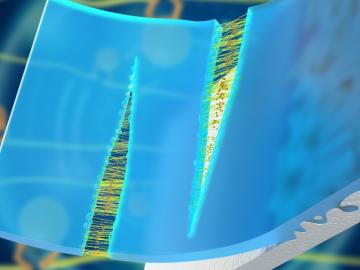
Filter News
Area of Research
- Advanced Manufacturing (1)
- Biology and Environment (11)
- Computer Science (1)
- Energy Science (20)
- Fusion and Fission (6)
- Fusion Energy (1)
- Isotope Development and Production (1)
- Isotopes (7)
- Materials (38)
- Materials for Computing (8)
- National Security (11)
- Neutron Science (4)
- Nuclear Science and Technology (5)
- Quantum information Science (1)
- Supercomputing (23)
News Type
News Topics
- (-) Advanced Reactors (12)
- (-) Chemical Sciences (35)
- (-) Cybersecurity (17)
- (-) Frontier (16)
- (-) Isotopes (20)
- (-) Microscopy (17)
- (-) Molten Salt (3)
- (-) Polymers (13)
- (-) Space Exploration (3)
- 3-D Printing/Advanced Manufacturing (48)
- Artificial Intelligence (35)
- Big Data (8)
- Bioenergy (25)
- Biology (26)
- Biomedical (17)
- Biotechnology (10)
- Buildings (15)
- Clean Water (2)
- Composites (12)
- Computer Science (63)
- Coronavirus (17)
- Critical Materials (11)
- Education (3)
- Element Discovery (1)
- Energy Storage (43)
- Environment (38)
- Exascale Computing (13)
- Fossil Energy (1)
- Fusion (17)
- Grid (16)
- High-Performance Computing (32)
- ITER (2)
- Machine Learning (13)
- Materials (60)
- Materials Science (56)
- Mercury (2)
- Microelectronics (1)
- Nanotechnology (29)
- National Security (18)
- Neutron Science (54)
- Nuclear Energy (28)
- Partnerships (31)
- Physics (26)
- Quantum Computing (13)
- Quantum Science (31)
- Security (12)
- Simulation (10)
- Statistics (1)
- Summit (22)
- Transportation (26)
Media Contacts

A team of collaborators from ORNL, Google Inc., Snowflake Inc. and Ververica GmbH has tested a computing concept that could help speed up real-time processing of data that stream on mobile and other electronic devices.

The U.S. Department of Energy’s Office of Science announced allocations of supercomputer access to 51 high-impact computational science projects for 2022 through its Innovative and Novel Computational Impact on Theory and Experiment, or INCITE, program.

Researchers at ORNL designed a novel polymer to bind and strengthen silica sand for binder jet additive manufacturing, a 3D-printing method used by industries for prototyping and part production.

Research teams from the Department of Energy’s Oak Ridge National Laboratory and their technologies have received seven 2021 R&D 100 Awards, plus special recognition for a COVID-19-related project.

Analytical chemists at ORNL have developed a rapid way to measure isotopic ratios of uranium and plutonium collected on environmental swipes, which could help International Atomic Energy Agency analysts detect the presence of undeclared nuclear

ORNL's Larry Baylor and Andrew Lupini have been elected fellows of the American Physical Society.

Pengfei Cao, a polymer chemist at ORNL, has been chosen to receive a 2021 Young Investigator Award from the Polymeric Materials: Science and Engineering Division of the American Chemical Society, or ACS PMSE.

Joseph Pickel has been elected a 2021 fellow of the American Chemical Society, or ACS. Pickel supports the Fusion and Fission Energy and Sciences Directorate as environment, safety and health

Sergei Kalinin, a scientist and inventor at the Department of Energy’s Oak Ridge National Laboratory, has been elected a fellow of the Microscopy Society of America professional society.

The U.S. Department of Energy’s Innovative and Novel Computational Impact on Theory and Experiment, or INCITE, program is seeking proposals for high-impact, computationally intensive research campaigns in a broad array of science, engineering and computer science domains.


